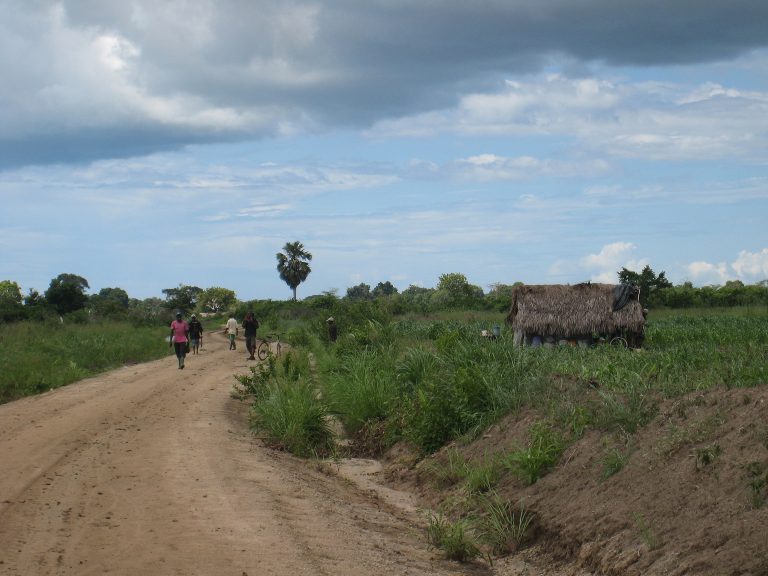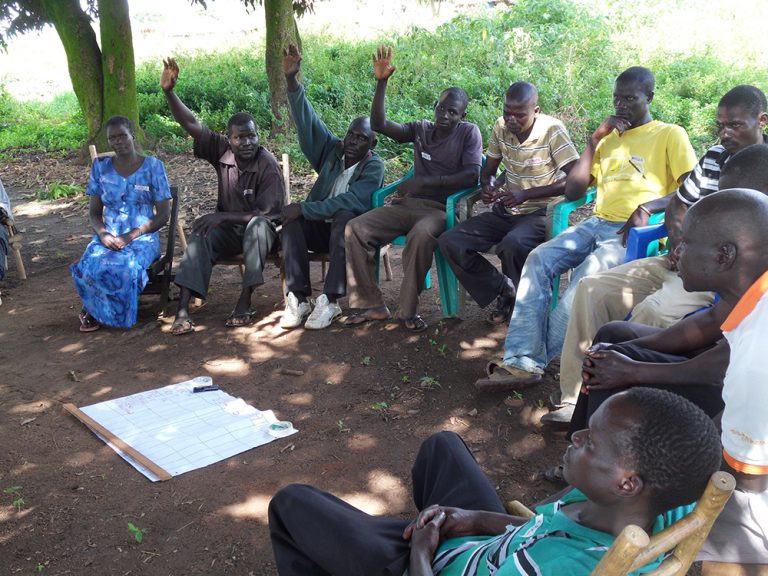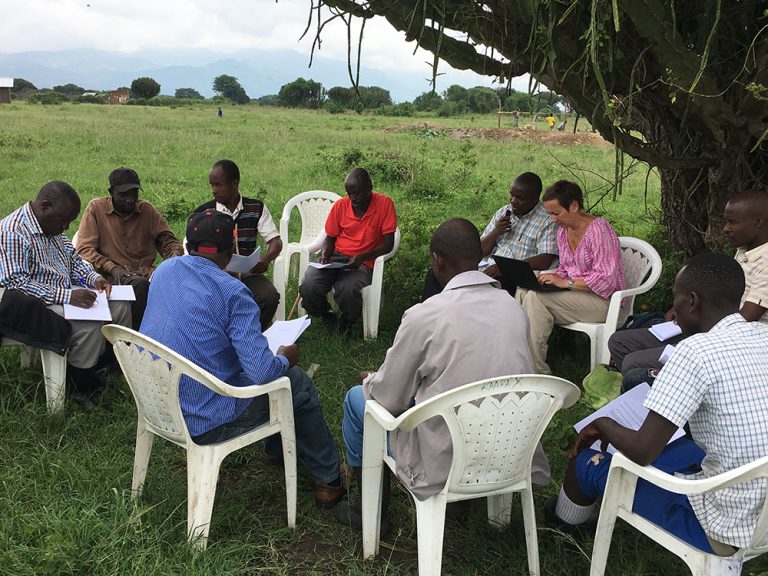Two students from SLU went to the 24th Conference of the parties (COP24) in Katowice, Poland. Read their blog posts with impressions and experiences from their stay.
A student at the COP24 – Why I would go again
By: Charlotte Ponzelar, MSc student in Environmental Communication and Management
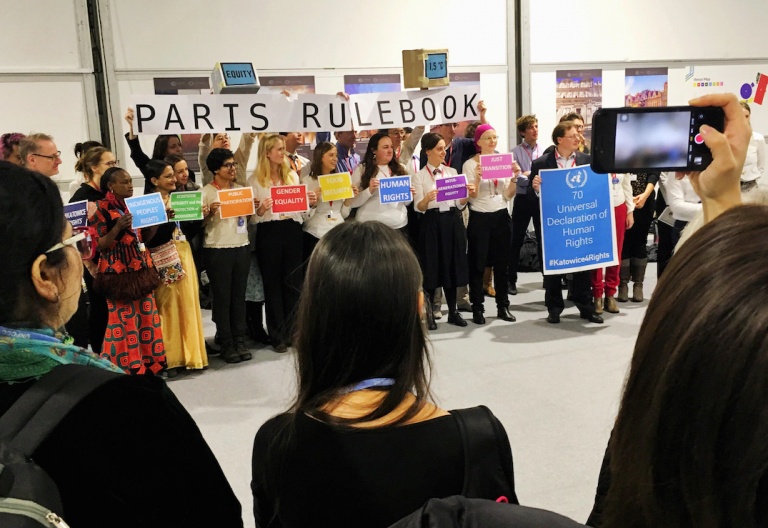
Demonstrating the connection between the Paris Agreement rule book and the 17 SDGs. Photo. Charlotte Ponzelar
Overwhelming, massive, colourful. These three words can barely describe all the impressions from my visit at the 24th Conference of the Parties (COP24) in Katowice, Poland. Since three years I wanted to be part of it and this year I am thrilled that I got my chance. My interest in environmental communication and education for sustainable development guided my journey through the exhibition halls in these four days of my stay. While decision-makers negotiated about detailed guidelines in the ‘rule book‘ for the implementation of the ParisAgreement from 2015, I found myself joining the ECOS (Education, Communication, Outreach Stakeholders) community in their daily meetings, exchanging experiences with environmental communication experts and I listened to different lectures and solution-oriented project presentations.
The mission of Article 6 of the UN Framework Convention on Climate Change (UNFCCC) is to improve Climate Change Education and was the topic of one of the round tables, that I had joined. The concept of education does not only provide knowledge about risks and challenges. It is a concept that is embedded in every subject to enable an understanding that everything we do has an impact and is affected by climate change. Climate Change Education can change the discourse to see the opportunities of finding solutions and adopt them for a better future by perceiving its critical components in interdisciplinary, local-action based collaboration. Still, participants of the discussion shared several experienced challenges in implementation. Among other things, they pointed out missing tools for educators and the lack of funding for their education. Climate Change Education provides an understanding that can enhance climate action. Nevertheless, knowing does not necessarily mean doing. It’s a controversial topic because there is a gap between knowledge and action, as in we know what would be right to do but we don’t do it. Which way of communication can lead to the behavioural change that is needed? Some of my course literature argues that connecting the human beings actions to Climate Change will cause the feeling of guilt and resistance within the individual. Sarah-Mae Nelson, a member of the National Network for Ocean and Climate Change Interpretation (NNOCCI), is convinced that „We can’t be part of the solution if we don’t see ourselves as part of the cause!“
Through my stay in Katowice, I had the chance to experience the power of many nations coming together to work towards a better future as a community. I strengthened my knowledge about the challenges we are facing and saw once more that the connection of Education and Communication is imperative to reach the societal and behavioural change that is needed.
I want to say thank you to SLU and SWEDESD (Sweden’s Academy for Sustainable Development), who enabled this rewarding opportunity and trusted me and my will to report from the COP24 and to get the best out of it.
My COP24 experience
By: Wiebke Homes, MSc student Environmental Sciences (EnvEuro), SLU
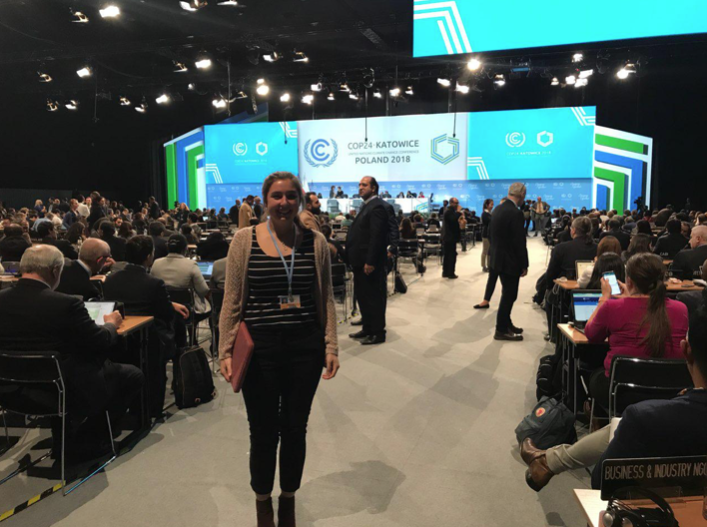
Me Wiebke, in the plenary of COP24.
This October, in the lead up to this years’ COP24 (Conference of the Parties) in Katowice, Poland, the Intergovernmental Panel on Climate Change (IPCC) of the United Nations Framework Convention on Climate Change (UNFCCC) published a special report on 1.5°C. The report outlines the impacts of climate change if global warming reaches 1.5°C above pre-industrial levels. Currently, the world has already warmed approximately 1°C but under current trajectories, and the nationally determined contributions which every country needs to develop under the Paris Agreement, it is estimated that we will reach a shocking warming of 3°C by the end of the century. The differences between 1.5°C and the targeted 2°C are already immense and it is hard to imagine what would happen if global warming exceeds 2°C. This special report showed the urgency of climate action and the need for stronger commitment.
The report made clear that at a 2°C warming, more than 99% of all coral reefs will disappear. Since I am very passionate about our oceans and the marine environment, this fact broke my heart. It was not the only time during the week at COP24 that it got very emotional for me. To get a better understanding I attended many scientific side-events about climate change and oceans, also in the pavilions. The British Pavilion showcased a way to grow corals five times faster than in nature by making use of the energy produced from waves. What was surprising to me as well, were the many partnerships that are already in place. The Commonwealth Blue Charter is one example and the exchange between Norway and the Pacific is another, as the melting of the glacier in the North has a direct effect on Pacific Island States which are threatened by sea-level rise. To withstand the challenges of climate change (sea-level rise as only being one of them), ambition, ambition, ambition, ambition and ambition are UN chief António Guterres five priorities, as stated in his speech about the climate crisis last week. The goal of COP24 was to adopt the rulebook for the implementation of the Paris Agreement and to give more support to developing countries from the developed countries.
Alongside thes scientific events, I was also working for the UNFCCC Secretariat. I am currently doing an internship within the Adaptation team in Bonn. Since I am responsible for supporting the National Adaptation Plans (NAPs) for the PacificIslands States, I met with the Ministers and/or other government officials from different countries in that region, for example Tuvalu, Solomon Islands, Vanuatu, Samoa and Fiji. Before COP24, I had already examined the progress of these countries with regard to their NAPs and needed to verify my collected data and fill in gaps. This was a great opportunity to meet climate leaders in person, build up trust between institutions and look behind the scenes of how climate politics works. It felt a bit weird and unreal to be surrounded by so many high-level politicians and heads of states and to walk alongside them in the corridors. Fun fact: It seemed like that the Russian and Saudi-Arabian lead negotiators were best friends, I only always saw them in a pair. Another cool fact: on Friday, high school students from Katowice followed Swedish 15-year old Greta Thunberg and did not attend school that day, striking for the climate under the motto of ’12 years left’. I once more noticed how important the voice of youth – future generation – is.
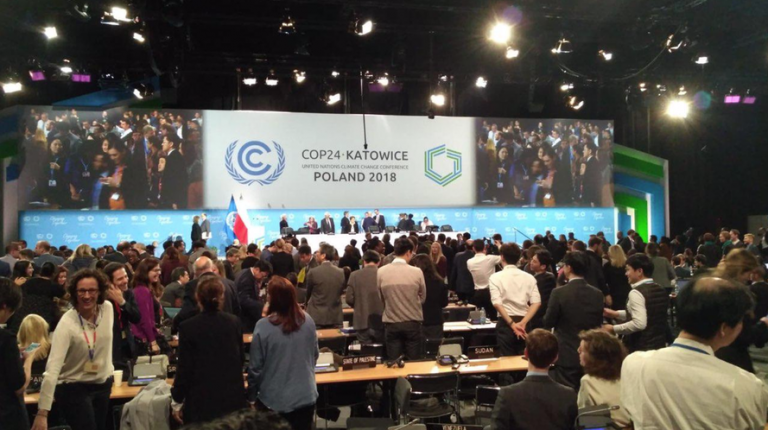
Saturday night, the Paris Agreement rule book is accepted! Photo: Wiebke Homes
Sleep-deprived but very, very relieved; that is how I felt on Saturday night. After several sleepless nights, hard work on the draft texts, consultations with different groups such as the Least Developed Countries Expert Group (LEG), the Group 77 + China or the High Ambition Coalition, closed meetings from the Green Climate Fund (GCF)and revisions upon revisions, the closing plenary finally started Saturday night after being postponed seven times with a 17.5 hours delay. Thanks to India, who in the spirit of pursuit accepted the rulebook last minute, the COP24 President Michał Kurtyka was able to say: “Hearing no objections, it is so decided.” Cheers and applause followed. This once again showed what multilateralism is capable of: 196 states, all with different intentions, found consensus on one single text (with the exception of Article 6 on carbon markets, which has been postponed to next years’ COP25 in Chile). Although the adopted rulebook is far from perfect, it is a step towards a low-carbon future. If we are to achieve reductions in emissions in half by 2030 and reach net zero by 2050, which would keep global warming well below 2°C, much more needs to be done.
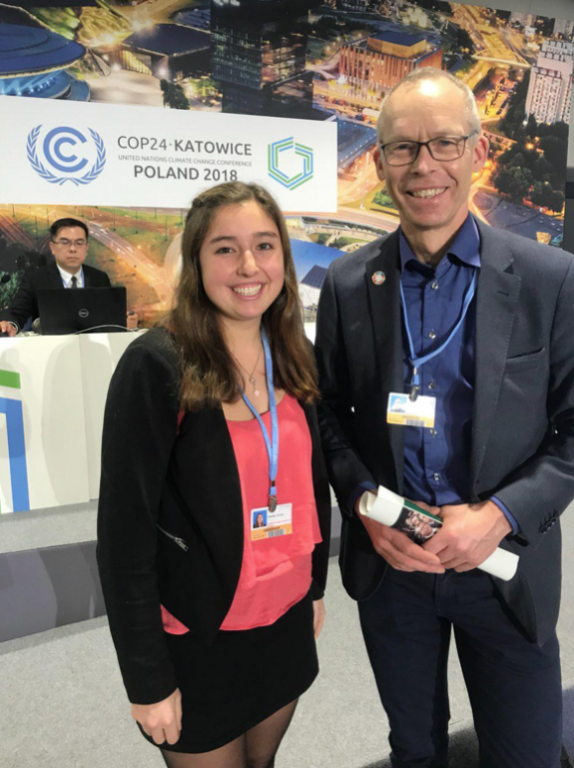
With Johan Rockström after his presentation on Future Earth – 10 ‘must knows’ about climate change.
It was an honor for me to go to COP24, as a representative of both SLU and the UNFCCC. I was able to connect to other students from around the world, to meet and have a chat with renowned scientists (e.g. Johan Rockström), and to speak up for climate action, pulling me out of my comfort zones several times. Going to COP was highly rewarding for me, especially because I got to be involved in background work to make the Paris Agreement actually work. As David Attenborough said in the first week of the COP, “every small bit matters”. Just by being in the middle of high climate politics was already fascinating enough.I have learnt so much during COP24 and I am very thankful for SLU for giving me this special opportunity. It was definitely the cherry on the cake of my Master’s degree and I hope to be able to go to next years’ COP25 as well – this time as an ambassador for our oceans!

